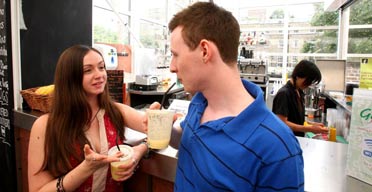
A decade ago, student unions made £1.2m a year on alcohol sales; today, the figure is closer to £600,000. "The drunken cheesy disco just doesn't cut it any more," says Hannah Bullivant, president of the student union at Goldsmiths, London. "There will always be a place for bars and pubs, but students want other places to hang out."
Enter the juice bar. Last summer, the student union at Leeds University was the first in the UK to have one. Since then, 12 student unions have followed its example.
The University of London union (ULU) is one of them. Its president, Jennifer Huseman, says: "It's quite possible that in the not too distant future, the centre of a student union will become the juice bar, rather than its alcoholic equivalent."
The end of alcoholic fun?
But will the - admittedly tempting - menu of sherbet lemonade, mango energiser and strawberry sunrise on offer at Leeds University's student union juice bar really sound the death knell for its sticky, but loveable, alcoholic equivalent? "For some students, the juice bar is going to replace an alcoholic bar, but not for all," says Lesley Dixon, chief executive of Leeds University student union.
"There will always be some sort of demand for alcohol, but the focus is moving away from this," agrees Huseman.
So what does this mean for the future of student union pub and bar crawls - a tradition that, some would say, is synonymous with the university experience? "Although these types of activities are represented, other more culturally diverse activities are often better attended, such as international women's week," says Bullivant.
University heads and student leaders say there are various reasons for the move away from alcohol. One is that students are more health conscious than ever. Gym membership is on the rise, according to NUS Services Ltd, which helps student unions stay profitable. Unions such as ULU have responded with healthy living campaigns.
Another is the change in the religious make-up of student populations. Alcohol is forbidden in Islam, and many Muslim students may feel uncomfortable socialising in a pub or bar. Some of the growing number of international students may feel similarly.
There are more women on campus, too, both on undergraduate and postgraduate courses. In 2002-03, there were 971,290 women on full-time undergraduate courses and 706,325 men. By 2005-06, women outstripped men by 1,047,860 to 742,885. Professor Julia King, vice-chancellor of Aston University, says this has meant a "move away from the student union being centred around the bar and masculine sports".
Huseman agrees. "We are moving away from a laddish culture at university and in the student union, probably because of equal opportunities policies."
But this is about more than just Muslim, international and female students. The whole student demographic is changing. Student unions must be mindful of the increase in mature students and those juggling work and family commitments. Student unions do not only have to be less alcohol-fuelled, they have to become more serious places.
Aston University, along with many others, has converted a floor previously used as a disco space into an alcohol-free "social work space". Here, students can hire laptops and work, as they sip coffee and eat a sandwich.
Cafe culture
Huseman says: "There's a cafe culture emerging. The union is now somewhere you can work, too. Students want to eat and relax while they are working. It is a less intense environment than the library."
Dave Lewis, treasurer of the National Union of Students, says unions are putting more of their resources into non-alcoholic venues. "Unions are increasingly diversifying the services they offer, both commercially and within the support aspects of their organisations," he says. "With students now paying more for higher education than ever before, there is greater expectation upon student officers to offer much more than just a safe environment for people to drink. Students are working more and have increased spending power, and unions need to diversify their income streams."
Yet another reason for the change is that the proportion of students living at home has jumped from 12% to 20% in the past two or three years. "These students' social circles are often the friends they made at school and at home," says Ian King, chief executive of NUS Services.
"We definitely have a different demographic to 30 years ago," agrees Bullivant. "We now have mature students with families who have different lifestyle patterns. We'll still put on events and have our own bars, but we have to think more creatively when we are putting on events. We have to think: are we integrating all the students?"
One result of all this, you might think, is less money spent on alcohol and healthier students. Not necessarily, though. Leeds University student union charges £2.25 for the Turbo Charge Smoothie in its juice bar - and King points out that there is just as much discarded fast-food packaging around campus as there ever has been.

